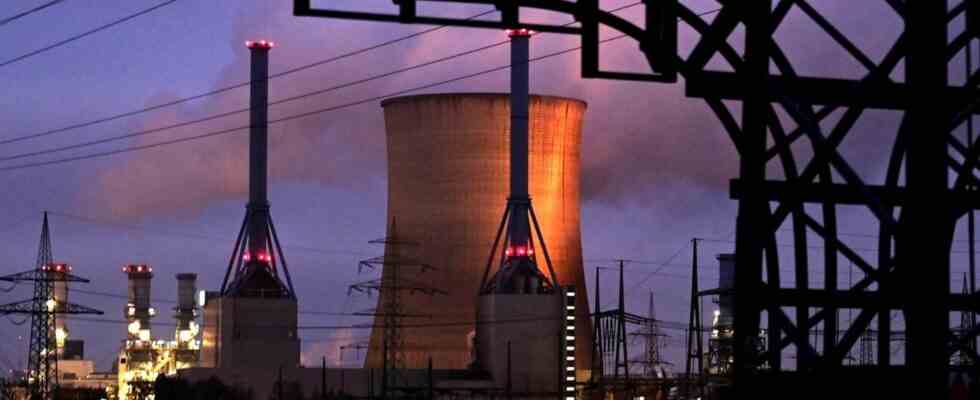extension of terms
Dear FDP and Union: Four reasons why the nuclear power debate is actually nonsensical
The nuclear power plant in Lingen is one of three still running reactors in Germany.
© Ina Fassbender / AFP
Everything has actually been said on the subject for a long time, but the FDP and Union are again bringing the extension of the lifetime of nuclear power into play. There are at least four good reasons why the debate is nonsensical.
The FDP remains stubborn and, despite resistance in the governing coalition, insists on talking about extending the lifetime of the nuclear power plants. The energy policy spokesman for the Liberals, Michael Kruse, even proposed a “nuclear power summit”. On the same day, the report came from Japan that four former Tepco managers, operators of the damaged nuclear power plant in Fukushima, were sentenced to have to pay the equivalent of 94.6 billion euros in damages. Nuclear power is always expensive – in normal operation and especially when accidents happen.
Even the nuclear power plant operators no longer want to
At the end of the year, the three kilns Emsland, Isar 2 and Neckarwestheim 2 that are still in operation are to be taken off the grid. That was decided eleven years ago and even the energy companies as owners are no longer interested in “returning to this risky and expensive technology,” as the head of the Federal Association of Energy and Water Management, Kerstin Andreae, said. The operator of the Emsland reactor said at the request of the star: “RWE considers the hurdles for a reasonable extended operation to be high.” In other words: Nobody in Germany has an interest in sticking with nuclear power.
Interestingly, it is the FDP and the Union, which is also in favor of nuclear power, who are now accusing the co-governing Greens of acting “ideologically” on the subject of extending the service life. The actual ideology consists in sticking to a technology for which nothing speaks either technically, economically or politically. And, depending on how you look at it, the environment and climate don’t even benefit much, as can be seen by looking at a few numbers and myths (which, admittedly, vary by coverage, sources, and distributors).
Can nuclear power plants continue to run beyond the planned end?
Rather not. It is possible to continue operating the plants at a lower level, but that would only help for a short time. One of the problems with this is the lack of staff, which is simply no longer planned. Above all, the reactors are running out of fuel rods. RWE writes: “Our Emsland power plant in Lingen is due to be phased out at the end of the year [2022, d. Red.] accordingly, we have also optimized the use of fuel for this date. New fuel elements have to be manufactured individually for each plant. According to our experience, the procurement of new fuel elements usually takes twelve to 24 months.”
Is nuclear power CO2 neutral?
no There are different statements about the carbon dioxide emissions from nuclear power plants. According to the IPCC climate commission, they emit between 3.7 and 110 grams of CO2-corresponding greenhouse gases per kilowatt hour – depending on whether you include the complete life cycle of a power plant in the calculation – i.e. including construction and dismantling – or just the pure operation – which also includes production and Transportation of uranium is included. The probable amount is probably in the range of 12 to 31 grams. With these values, nuclear power is in a better position than fossil energy production, but is by no means at the level of renewable energy sources.
Is nuclear power good enough to replace gas?
At most indirectly. Firstly, nuclear power plants generate electricity and not heat. Therefore, they are not a substitute for missing gas deliveries. However, about twelve percent of the natural gas is used to generate electricity. Therefore, the argument is that this gas can be saved if nuclear power plants generate the energy instead. The majority of this gas generation, however, goes to combined heat and power plants and to industrial or decentralized combined heat and power plants. However, this reduces the possibility for gas savings in thermal power plants.
Is nuclear power cheap?
That’s only true as long as the construction and maintenance of power plants are supported by the state. The operation is only worthwhile if there are considerable tax breaks and subsidies for the complex construction (and dismantling) of a nuclear reactor and the maintenance (e.g. the disposal of nuclear waste). According to estimates, Germany has subsidized nuclear power plant operators with around 187 billion euros over the past 40 years. This does not include the costs of possible accidents. The liability insurance would only pay for a maximum of 2.5 billion euros in damage. According to the Forum for Ecological and Social Market Economy, a kilowatt hour of nuclear power actually costs around 42 cents. Comparison: Wind energy is around 8 cents.
Even if one generously overlooks one or more of these objections, the discussion about the extension of the term remains “completely nonsensical”, as SPD leader Saskia Esken put it. Chancellor Olaf Scholz also sees no “requirement to be able to devote any further to this question.”
Sources: DPA, AFP, FEDERATION, German wave, DeutschlandfunkRWE, destiny“mirror“


